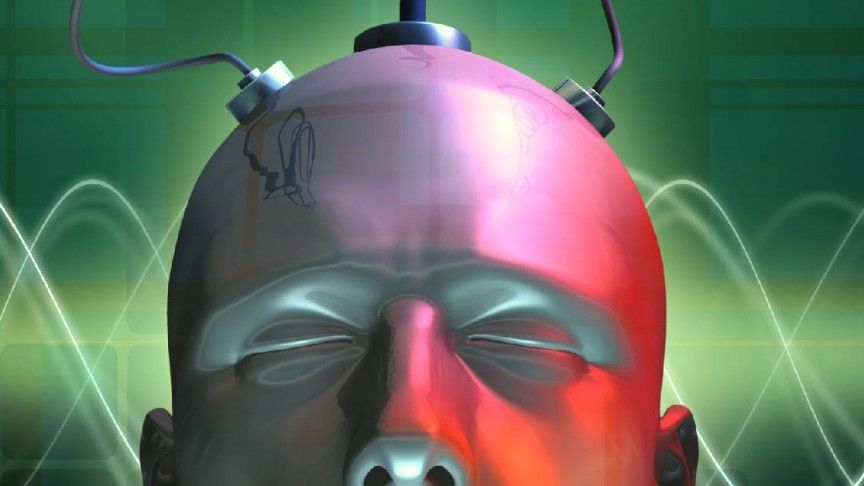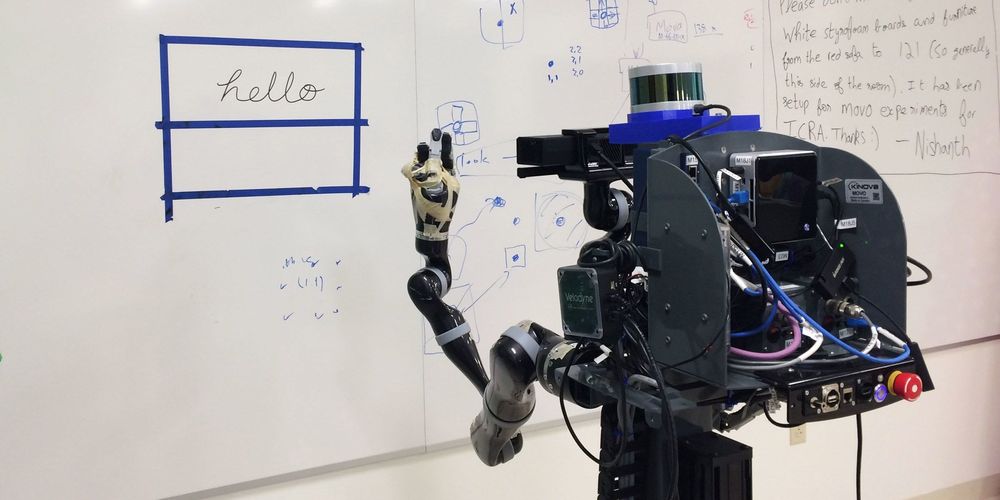About the Author
Paul Tilghman is a program manager in the Microsystems Technology Office of the Defense Advanced Research Projects Agency, where he’s been overseeing DARPA’s Spectrum Collaboration Challenge.

About the Author
Paul Tilghman is a program manager in the Microsystems Technology Office of the Defense Advanced Research Projects Agency, where he’s been overseeing DARPA’s Spectrum Collaboration Challenge.

Top artificial intelligence (AI) expert and founder and CEO of Fountech.ai Nikolas Kairinos said in a Daily Star interview that within 20 years we could have implants put into our heads that will allow us to learn everything. “You won’t need to memorize anything,” said the specialist to the Daily Star.
RELATED: NEURALINK: HOW THE HUMAN BRAIN WILL DOWNLOAD DIRECTLY FROM A COMPUTER

Many mutations in DNA that contribute to disease are not in actual genes but instead lie in the 99% of the genome once considered “junk.” Even though scientists have recently come to understand that these vast stretches of DNA do in fact play critical roles, deciphering these effects on a wide scale has been impossible until now.
Using artificial intelligence, a Princeton University-led team has decoded the functional impact of such mutations in people with autism. The researchers believe this powerful method is generally applicable to discovering such genetic contributions to any disease.
Publishing May 27 in the journal Nature Genetics, the researchers analyzed the genomes of 1,790 families in which one child has autism spectrum disorder but other members do not. The method sorted among 120,000 mutations to find those that affect the behavior of genes in people with autism. Although the results do not reveal exact causes of cases of autism, they reveal thousands of possible contributors for researchers to study.
Hours spent toiling away under the beating sun to harvest berries and fruit may soon be a thing of the past as robots look set to replace humans in the field.
A £700,000 machine built by the University of Plymouth has succeeded in plucking a raspberry from a plant and carefully placing it in a punnet.
The painstaking process takes a whole minute to get one berry because it requires a combination of soft robotics, clever AI and ‘deep learning’.
Scientist have just discovered that, at an atomic level, these elements have both liquid and solid states, giving context to what may be hidden in the cores of celestial bodies.
A New State of Water Reveals a Hidden Ocean in Earth’s Mantle — https://youtu.be/pgm4z8vJVVk
On the chain-melted phase of matter
https://www.pnas.org/content/116/21/10297
“We develop here a classical interatomic forcefield for the element potassium using machine-learning techniques and simulate the chain-melted state with up to 20,000 atoms. We show that in the chain-melted state, guest-atom correlations are lost in three dimensions, providing the entropy necessary for its thermodynamic stability.”
Elements can be solid and liquid at same time
https://www.ed.ac.uk/news/2019/elements-can-be-solid-and-liquid-at-same-time
“A team led by scientists from the University of Edinburgh used powerful computer simulations to study the existence of the state – known as the chain-melted state. Simulating how up to 20,000 potassium atoms behave under extreme conditions revealed that the structures formed represent the new, stable state of matter. Applying pressure to the atoms leads to the formation of two interlinked solid lattice structures, the team says.”
Information on Alkali Metals
“Alkali metals react with water to produce heat, hydrogen gas, and the corresponding metal hydroxide. The heat produced by this reaction may ignite the hydrogen or the metal itself, resulting in a fire or an explosion. The heavier alkali metals will react more violently with water.“
____________________
Elements is more than just a science show. It’s your science-loving best friend, tasked with keeping you updated and interested on all the compelling, innovative and groundbreaking science happening all around us. Join our passionate hosts as they help break down and present fascinating science, from quarks to quantum theory and beyond.

Imagine the possibility of integrating mixed reality (XR) tech with that of this AImagine having a long, open conversation about philosophy with either Immanuel Kant or David Hume. Imagine being given a private lesson in economics by either Adam Smith, John Maynard Keynes, or Karl Marx. The possibilities are seemingly abundant. But then so are the risks.
A lot of coverage has been done on the emergence of what are known as “deepfakes” here on Serious Wonder the last few years. They’ve captivated us at times and then frightened us. The implications of this growing technology are practically limitless, especially as our ability to tell the difference between what is real and what is fake diminishes even further.
And just when you thought you could take a breather, Samsung decided to develop a new artificial intelligence system that makes generating deepfakes that much easier. Using nothing more than a single image, the AI system, known as “few-shot adversarial learning,” is able to create a fake clip that seemingly allows that image to burst to life.

‘It’s not always convenient for people to leave their homes to retrieve deliveries or for businesses to run their own delivery services,’ Ken Washington, chief technology officer at Ford, wrote in a blog post.
‘If we can free people up to focus less on the logistics of making deliveries, they can turn their time and effort to things that really need their attention.
‘Enter Digit, a two-legged robot designed and built by Agility Robotics to not only approximate the look of a human, but to walk like one, too,’ Washington added.
A nimble robot inspired by bush babies can now bounce three times its own height in a single leap.
SALTO (saltatorial locomotion terrain obstacles) was fist designed to jump at 4mph (1.75 m/s) but a host of new features have now been added to the nifty machine.
A single leg, inspired by those of the galago, or Senegalese bush baby, propels the robot across a range of terrain and over various obstacles.